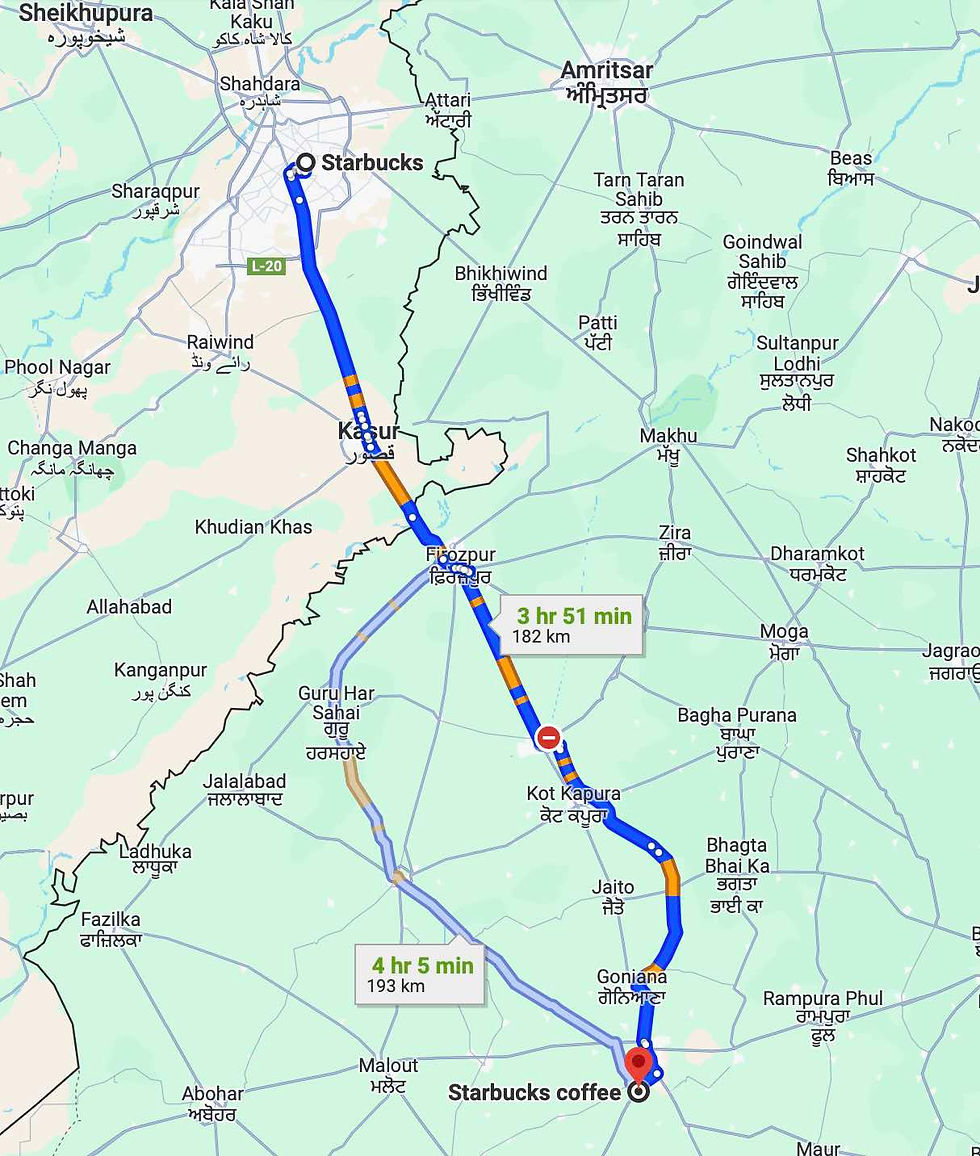Convergence of Similarities
- Ramanjit Singh
- Mar 26, 2024
- 3 min read
Updated: Mar 27, 2024
Ramanjit Singh

Visiting India and sitting at a Starbucks in Green City Square Bathinda, Punjab, I had an odd thought about how far would be the distance from the place I was having coffee to a Starbucks in Lahore (Gulberg to be precise). The driving distance is about 180 kilometers.
I was thinking what a drive that would have been! Seeing the green fields of the most fertile land, crossing rivers and canals, seeing the villages that jot the landscape. That drive would be epic. It would be like a journey back in time, a lesson in history, when everything was once part of a united Punjab. The drive would take us from Bathinda to Ferozepur and then onto Kasur and Lahore. Distance from Amritsar, Ludhiana or Jalandhar would be far less. Within a mere hundred kilometer radius, you can reach all the major cities and towns of central Punjab, east or west.
However, even if the distance is insignificant, the distance has grown in our minds about each other. Talking to the young generation about lehnda Punjab is like talking about an alien country altogether, for which they have little affinity or kinship. The towns, cities or even villages of their forefathers who came from west Punjab are no longer in their current lexicon. Everything about west Punjab seems too distant, too forgettable. Today's generation has become distant from the memories of Partition. Maybe this is a positive thing, that the baggage of what happened in that year is no longer forcing them to look at their fellow Punjabis on the other side of the divide with hate. I guess being indifferent towards someone is still better than to hate someone. But this is yet to be seen. And I'm sure this is true on the other side as well.
Maybe the arrival of Starbucks, as a symbol, can inculcate a feeling of oneness. Maybe the modernization of Punjab can bridge the distance that remains in our minds. If we can drink the same coffee and have that same experience in a cafe, which also provides a fleeting moment of escape from the mundane, then maybe this convergence of similarities can help the new generation be more receptive towards each other. The simple feeling that "they are just like us" is more powerful than any other to unite people despite their inherent religious differences. Culture unites, similar experiences unites, and religion most often divides.
In eastern Punjab, the names of the cities in western Punjab that were once so close to us are no longer mentioned in our conversations. Lahore is barely mentioned, nor is Rawalpindi, Jhelum, Lyallpur or Sheikhupura. The newer generation of Punjabis have lost that sense of belonging to the land on the other side of the divide. When I was growing up, as part of the second generation after Partition, I still remember people talking about these cities. Now it is completely absent from our vocabulary. Rare mentions of these cities due to Sikh pilgrims going to historical gurdwaras still exists but the common folk have lost all cultural linkages with western Punjab. And this is also true for the Punjabis on the other side of the divide.
This loss has also removed the stories, historical knowledge that once was commonly known among the people. I remember the first generation of post-partition Punjab talking about a great wrestler from such and such place or a famous singer from such and such village in western Punjab. These stories were no longer passed on to the third or fourth generation of Punjabis who are growing up now. Memories of the old Punjab are all but gone from our collective conscience.
And this loss of a common memory among Punjabis is immeasurable.
But maybe, it could be the similarities in our shared cultural experiences, our shared lifestyles, probably encouraged by the arrival of western consumer brands can unite us. After all people who go to Starbucks on both sides and drink lattes cannot be that different from each other. Maybe my mind is playing Jedi mind tricks on me, it could be a stretch but a thought nevertheless.














Comments